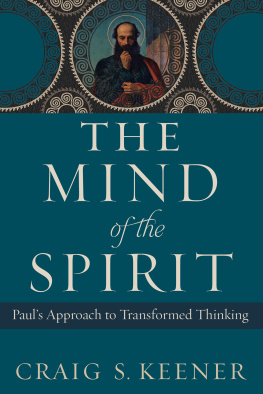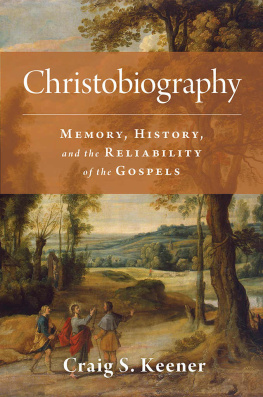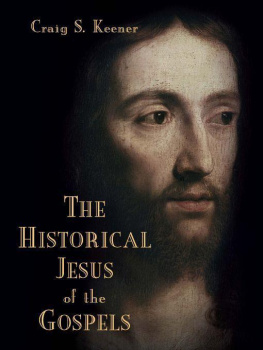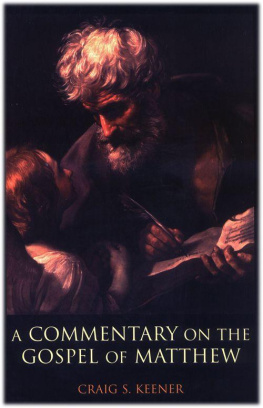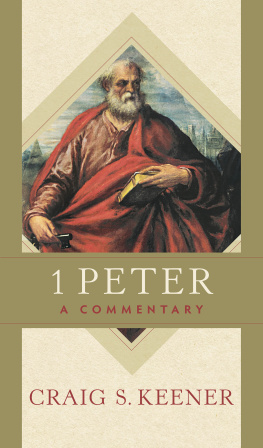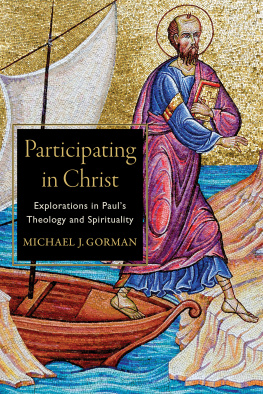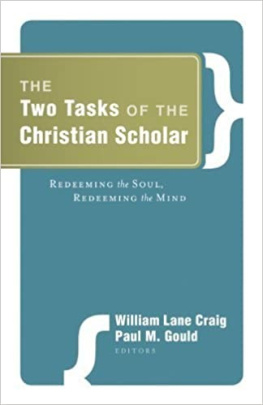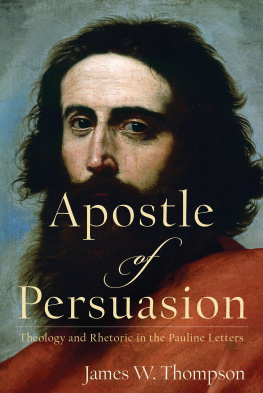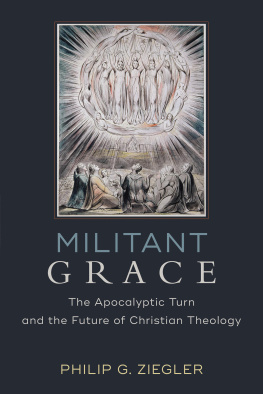Craig S. Keener - The Mind of the Spirit: Paul’s Approach to Transformed Thinking
Here you can read online Craig S. Keener - The Mind of the Spirit: Paul’s Approach to Transformed Thinking full text of the book (entire story) in english for free. Download pdf and epub, get meaning, cover and reviews about this ebook. year: 2016, publisher: Baker Academic, genre: Religion. Description of the work, (preface) as well as reviews are available. Best literature library LitArk.com created for fans of good reading and offers a wide selection of genres:
Romance novel
Science fiction
Adventure
Detective
Science
History
Home and family
Prose
Art
Politics
Computer
Non-fiction
Religion
Business
Children
Humor
Choose a favorite category and find really read worthwhile books. Enjoy immersion in the world of imagination, feel the emotions of the characters or learn something new for yourself, make an fascinating discovery.
- Book:The Mind of the Spirit: Paul’s Approach to Transformed Thinking
- Author:
- Publisher:Baker Academic
- Genre:
- Year:2016
- Rating:5 / 5
- Favourites:Add to favourites
- Your mark:
- 100
- 1
- 2
- 3
- 4
- 5
The Mind of the Spirit: Paul’s Approach to Transformed Thinking: summary, description and annotation
We offer to read an annotation, description, summary or preface (depends on what the author of the book "The Mind of the Spirit: Paul’s Approach to Transformed Thinking" wrote himself). If you haven't found the necessary information about the book — write in the comments, we will try to find it.
The Mind of the Spirit: Paul’s Approach to Transformed Thinking — read online for free the complete book (whole text) full work
Below is the text of the book, divided by pages. System saving the place of the last page read, allows you to conveniently read the book "The Mind of the Spirit: Paul’s Approach to Transformed Thinking" online for free, without having to search again every time where you left off. Put a bookmark, and you can go to the page where you finished reading at any time.
Font size:
Interval:
Bookmark:
ISBN 978-1-4934-0460-5 Unless noted otherwise, all translations of Scripture are those of the author. Scripture quotations labeled NEB are from The New English Bible . Copyright 1961, 1970, 1989 by The Delegates of Oxford University Press and The Syndics of the Cambridge University Press. Reprinted by permission. Scripture quotations labeled NRSV are from the New Revised Standard Version of the Bible, copyright 1989, by the Division of Christian Education of the National Council of the Churches of Christ in the United States of America. Used by permission.
All rights reserved. Chapter 4, The Mind of the Spirit (Rom. 8:57), is mostly new work, but, with the permission of Brill, incorporates a revision of Craig S. Keener, Fleshly versus Spirit Perspectives in Romans 8:58, in Paul: Jew, Greek and Roman , ed. Stanley Porter, PAST 5 (Leiden: Brill, 2008), 21129. 3:12), is adapted, with the permission of Sheffield Phoenix Press, from Craig S. 3:12), is adapted, with the permission of Sheffield Phoenix Press, from Craig S.
Keener, Heavenly Mindedness and Earthly Good: Contemplating Matters Above in Colossians 3.12, JGRCJ 6 (2009): 17590.
The Mind of the Flesh (Rom. 7:2225) Depiction of Christian or Pre-Christian Situation? Earlier Interpreters Survey of Modern Views Romans 7:725 as the Christian Life Romans 7:725 as a Non-Christian Experience Why Use Present-Tense Verb Forms? Who Is the I in Romans 7? Autobiographical? Generic or Projected I Adam? Israel Survey of the Context and Function of Romans 7:725 The Problem of Passion Passion and the Law in Hellenistic Jewish Sources Desire in Romans 7:7 E XCURSUS : Ancient Views concerning Lust and Other Illicit Desires Judean Passions: The Evil Impulse Internal Conflict Ancient Beliefs about Internal Struggle Envisioning Someone Overwhelmed by Passion Bondage of the Will? Wanting to Do Right Law in Ones Body versus Law in Ones Mind (Rom. 7:2225) Law in the Mind The Law, the Body, and Sin Bodily Desires in Ancient Thinking E XCURSUS : Flesh Paul and the Body An Image of Defeat E XCURSUS : Ancient Military Metaphors Conclusion 4. The Mind of the Spirit (Rom. 8:57) The New Frame of Mind Disposition and the Mind Relation to the Defeated Mind of Romans 7 Contrast with the Law-Approach of Romans 7 Two Ways of Thinking The Emphasis on Wise Thinking in Philosophy Ideal Types Two Categories in Humanity as Ideal Types Jewish Ideal Types Sharing Gods Mind Sharing the Divine Mind in Greek Thought Indwelling Deity in Gentile and Jewish Thought Experiencing the Spirit The Frame of Mind of the Spirit Is Peace (Rom. 8:6) Tranquil Minds in the Philosophers Possible Exegetical Basis for the Peaceful Mind Community Tranquility Conclusion Presenting Bodies as Sacrifices Sacrifices in Antiquity A Living Sacrifice A Rational Sacrifice Transformed versus Conformed The New Age versus the Old Renewal for a New Age The Mind and Transformation Discerning Gods Will Evaluative Criteria Good, Pleasing, and Perfect as Criteria The Literary Context for This Renewing of the Mind Gods Own Mind in the Preceding Context A Mind for the Body of Christ in the Following Context Conclusion 6.
The Mind of Christ (1 Cor. 2:1516) True Wisdom (1 Cor. 1:182:10) The Wisdom of the Cross (1 Cor. 1:172:5) Wisdom of the Future Age (1 Cor. 2:610) The Spirits Insight (1 Cor. 2:1011) Understanding by Gods Spirit versus the Worlds Spirit (1 Cor. 2:1213) Spiritual Competence to Assess Truth (1 Cor. 2:1415) A Pervasive Culture of Evaluation Evaluation Criteria Inability to Understand Spirit Matters (1 Cor. 2:1415) E XCURSUS : Natural and Spiritual Persons Suggested Sources of the Language Mortals in Adam versus the Spirit of Christ We Have the Mind of Christ (1 Cor. 2:16) Pauls Biblical Basis Revealing Gods Mind Ministry Gifts and Gods Mind Divine Inspiration and Empowerment, Not Divine Identity (1 Cor. 3:34) E XCURSUS : Divinization in Greek and Roman Tradition Transformation through Vision (2 Cor. 3:18) Hellenistic Vision of the Divine Jewish Vision of the Divine and Gods Image Glory Revealed to Moses and Jesuss Agents The Experience of the Spirit Conclusion 7. 3:18) Hellenistic Vision of the Divine Jewish Vision of the Divine and Gods Image Glory Revealed to Moses and Jesuss Agents The Experience of the Spirit Conclusion 7.
A Christlike Mind (Phil. 2:15; 3:1921; 4:68) Divine Peace Guards Minds in Christ (Phil. 4:7) Celebration in Christ (Phil. 4:4) Prayer Rather Than Worry (Phil. 4:6) Considering What Is Pure (Phil. 2:5) Citizens of Heaven (Phil. 3:20) Conclusion 8. 3:20) Conclusion 8.
The Heavenly Mind (Col. 3:12) Contemplating Heavenly Matters (Col. 3:12) Heavenly Mindedness in Greek and Roman Sources Heavenly Mindedness in Early Jewish and Christian Sources Where Christ Is Enthroned (Col. 3:1) Heavenly Beings or Gods Throne The Exalted Christ Moral Implications of Heavenly Contemplation En-Christed Life The Intelligibility of the Moral Connection for Ancient Hearers Heavenly Afterlife and Colossians Conclusion Conclusion Postscript: Some Pastoral Implications Divided Churches Divided Hearts? Pastoral Psychology Worldviews Practically Implementing the Insights Appendix A: The Soul in Ancient Mediterranean Thought The Soul as a Distinct Entity The Souls Afterlife Jewish Thinkers regarding Soul and Body Jewish Thinkers regarding the Afterlife Appendix B: Some of Gods Wise Plan in Pauls Bible Bibliography Index of Subjects Index of Authors and Selected Names Index of Scripture Index of Other Ancient Sources Back Cover
Font size:
Interval:
Bookmark:
Similar books «The Mind of the Spirit: Paul’s Approach to Transformed Thinking»
Look at similar books to The Mind of the Spirit: Paul’s Approach to Transformed Thinking. We have selected literature similar in name and meaning in the hope of providing readers with more options to find new, interesting, not yet read works.
Discussion, reviews of the book The Mind of the Spirit: Paul’s Approach to Transformed Thinking and just readers' own opinions. Leave your comments, write what you think about the work, its meaning or the main characters. Specify what exactly you liked and what you didn't like, and why you think so.

